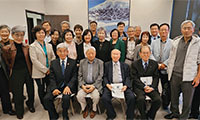▶ Los Angeles Survival
▶ Jewish In-laws
Decision was made for Mary and Dora to proceed with the visa to New York, and the father and two youngest to remain behind. The sisters would not meet again for many years. Skolnick, although responsible for his wife, was not permitted to stay in Belgium and returned to Romania with the small ones. On their arrival the girls were immediately placed in an orphanage and left there for many years. Betty lost track. Then one day their father came for them. He did not explain his long absence. He was not one to talk, Betty said. But Betty had ears and she heard the word Hiatus and decided it was the name of their sponsors making it possible to go to America. They reached Ellis Island, believing their sisters or uncle would come with the visa issued yeas before. Immigration held them for two months and denied them entry. Again Hiatus arranged for them, this time to Canada. The United States passed new laws in 1921 and 1924, restricting immigration. The first was based on a quota system, the second on national origins , which also closed doors to those aliens ineligible for citizenship, specifically the Japanese and Orientals. Earlier laws had forbidden the Chinese.
When the girls reached Toronto, once again they were left in an orphanage until declared old enough to care for themselves in a motherless home. Skolnick did not prosper. He sold his wares from a pushcart. Later he rented space in their buildings basement and opened a fruitstand. Betty was old enough to work evenings so he could take off. It was a dull life for Betty and Pearl. Their older sisters were doing well in New York. The uncle provided them with an education and they married. Betty s dream was to get to the United States and live like them. The sisters were financially in a position to search for their mother, and traveled to Belgium, found her fit to travel, and brought her to Toronto. It was a time of family reunion, a joyous occasion. But it wasnt. Sarah, their mother, was unable to respond to shows of affection. The New York sisters stayed no longer than it took to deliver their mother. Betty was sad they made no contact after so long apart. She said Mary and Dora had so much to be happy with. But Dora, in middle age, committed suicide. Mary died much later, of heart attack. The meeting brought Betty and Pearl closer together, they were the only family they had each other. Today they are in communication regularly. Betty, 84, and Pearl 81. Pearl had a cancer operation last year, and it is in remission. When they speak on the phone, they remind themselves they are the only immigrants of the family living. Although there are many children, grandchildren and great-grandchildren.
For Betty the fruitstand was a happy venture. She went on a blind date and met her future husband. His name was Arthur Gold. He followed up the date to purchase fruit, then returned to court her. Betty said it was romantic. He proposed, had her fathers permission to marry her and live happily ever after. Two girls were born, Bernice and Sandra, in Canada; and Betty and Arthur emigrated to Los Angeles. It was in 1947. Betty remarked she finally made it to the United States as an immigrant! Arthur was a printer and opened a business printing menus for restaurants, to places like drugstore lunch counters and drive-in stands where carhops handed customers menus to order from. The Golds moved from Boyle Heights and made a home in the Fairfax District. The girls attended Fairfax High School. Bernice graduated but Sandra dropped out in her junior year to elope with a classmate. She was 17.
* * *
This introduction is overlong for an everyday story about immigrants, their marriages or family experiences. All daily occurrences. Yet the events cover three generations and the outcome surprising, at least for me. Sandra Gold married my brother Jack after her teenage marriage failed. She had three girls: Cheryl, born 1958; Lori, 1960; Julie, 1962. Actually, it is the girls stories this writing of words have been leading up to. But then, where would we be without their ancestors? or their beginning?
Next, I asked Sandra when I informed her about the piece, Whats the title to be? She answered, Kimchee and Matzo ball. So, there is nothing more to be said of their alliance than it was very good. Like spicy kimchee and healthy matzo ball.
Jack retired from the army, looking to a life of ease, fishing, football games at the Coliseum (Rams home), sightseeing, etc. He met Sandie, the name she is affectionately known by. She lived next door to a friend he was visiting. Cheryl, nearing five years, took an instant liking to him, or it may have been his Buick station wagon in which she would soon be riding. One day she greeted him, Hello, Daddy, unexpectedly sweet and endearing to his campaign-hardened heart. Her greeting, when I heard the account, suggested John Aldens approach with Priscilla, but in reverse. Cheryl s intuition was correct. Jack proposed to Sandie and they were wed. And forgotten were the thoughts of a bachelors life of ease, although he didn t think he was giving up anything; he was gaining a warm family, which he had not experienced since his mother died. His first thoughts were how to support the ready-made family. His retirement pension was good enough for him, but he had four ladies hed like to live in style. (Not his words, his enthusiasm when I was introduced to them.) He went to work with the VA hospital in Sepulveda. He had not trained for anything but warfare, now he said he d do something to heal. Sandies thought was to have a child to meld their marriage, and she went ahead and had a son, who was named Terry. Terry grew up to be like Jack, steady and reliable. He and Julie spent time with me in their babyhood, so to speak. When they reached advanced age, like about seven, they sought out friends; I d become too old to keep up. After Terrys birth, Sandie attended adult education classes and received her diploma (GED); then a year at Valley College, and office practice followed. Then she was prepared to help with the family budget. Both parents working, children in school, and the house to keep up, Jack never worked such a schedule in the army, but he was happier.
As parents, the two followed Betty and Arthur s philosophy, to give the children space to grow in and learn to make decisions. Cheryl graduated from high school, married Richard Latimer whom she met at work. The company was relocated to Arizona, and the Latimers moved. Cheryl was brave, like Jack, taking on new responsibilities. Richard was divorced and had two children, a part-time father, and she a part-time mother until her children were born. When they arrived, she had a stay-at-home business. It was insurance work she carried on with the computer. Also her children were cooperative too, and her life, while very busy, was very satisfying.
The children are Daniel, 12, described as talented; Sydney Louise, 9, who at 3 years read; Sarah Nicole, 7, a straight A student, shy and loving; Shannon Leigh, 5, as happy, not a serious bone in her little body, wonderful to be around. An abundance of love in the family.
But it was of the faith she had found since her marriage that was most interesting, fitting in with the events that took place early this year that involved parents Jack and Sandie, and the role their childrens religion was to affect. Cheryl wrote of her conversion: that Richard was an inactive Mormon when they married. Then his parents died and he was depressed, unable to pull himself out of the gloom. I thought that if he went to his church, he would feel better. I went with him; went to all the meetings. Learned lots of things and never doubted anything I heard. It took five years to join the church, mainly because I didnt want to give up my Jewish heritage. But then I was told that I wouldn t have to because it is a Birthright so I was baptized. Currently she is working on the monthly ward news letter. Her past work included teaching primary children, three to four years of age; serving on the Homemaking Committee, a womens organization, the relief society. She also pointed out that she had not been exposed to either the Jewish traditional religion nor the Christian, although she would go to Sunday school with friends, from time to time. Now prayer is the focal part of being Mormon.
Lori, like Sandie, dropped out of high school, married Jergon Olivera, his mother Swedish and his father Basque; his father committed suicide when Jergon was 16. Jergon and she had a son Andrew now 20, and daughter Lindsay, 17. The marriage broke up and Lori was a single mother. She writes: I have been a born-again Christian since 1985. She is active in her church (Nazarene, a Protestant fundamental-evangelist sect). My children have been brought up in the Christian church and were baptized into the faith when they were in grade school. I am the bookkeeper for my church ... recording tithes, making yearly tax statements . . . doing payroll . . . I am also the leader of our churchs Prayer Chain, which is a ministry of prayer for those in need. She also noted that My parents did not play a part in my decision to become a Christian. My father was pretty much religion-neutral and my mother was Jewish. The fact that I consider myself a Christian is enhanced by the fact I was born a Jew. I embrace my Jewish heritage and it only makes my Christian experience that much more fulfilling. Surely a statement of faith! It is like Lori herself, a positive personality. She is also an adult student, describing her efforts for a future: I dropped out of school in my junior year. I went back . . . got my high school diploma when I was 22. I attended the local Community College, received my Associate s degree in general education with a 4.0 grade point average. She has completed her first semester at CSU Chico this past year. She aims for a BA in Social Science, with a minor in Conflict Resolution. And attends part-time. She also has a full-time job at the Community College in Bishop, CA. as program manager for the Online Education Program, managing 70 online undergraduates courses and 2000 students. Once she has her BA degree, she will go for a Masters in Education. Then she will have a chance to go anywhere for work, and live her life of faith.
Julie was the first in Jack s family to earn her Community College AA. She married, has a daughter Jacklyn Beauregard, now 13. Julie has Hepatitis C, the source believed to have been an unsterilized tattoo needle when she was 19. She has had a rich life, many experiences but was unable to cope with an interview at this time. When she was diagnosed with hepatitis, she underwent other tests, and one came up she was bipolar. During the past years, with Cheryl and Richards help (prayers), she was baptized in the Baptist church. She too is firm in her new faith, and believes in prayer as a method of healing. She is only 38 years old, and has many years to regain her health.
Terry met his wife when they were students at Fresno State. They have three sons, Jeffrey, Jeremy, David Christopher now three. Their mother Karen graduated and has her BA and is allowed to teach the boys at home. Karen calls the project homeschooling and feels the public schools are in a state of anarchy. Besides the required subjects, religious study has been added. Terry and she are Nazarene churchgoers, and staunch supporters, and are pillars ; they are found oftener at church work than at home. Terry works for the Tulare irrigation water works.
The childrens background was necessary to the events Jack and Sandie underwent. They had cancer surgery early in the year. Last year Jack had angioplasty surgery. This year a diagnosis of colon cancer. When he was due for surgery, Sandie learned she had possible cancer in her breast and had a mammogram. Occupied with Jack s cancer, she held off on her own. The children were advised of Jacks operation, and Lori and Terry came to be with him at the hospital. Both are prayer leaders. Sandie was happy for their presence. Cheryl and Julie, in Arizona, held prayer meetings too. The operation was successful, and he was released the same afternoon. That was a Friday. Sunday morning he awoke with high fever, vomiting and hemorrhaging and was returned to the hospital. Terry and Lori held their healing prayer hours with Jack. Sepsis had developed, a bacterial infection, and antibiotics were used. Jack could not hold food in his stomach and food is necessary for the medicine to work. So his condition was critical. On Thursday, the doctors allowed Terry and Lori to remain all day and no longer spoke reassuring words. A Korean ultrasound technician who heard of the case came in to pray with them. On leaving she said, He will be all right. He is Korean. The next morning Jack awakened, refreshed, took the first food hed had all week. Science had done its job, and I know prayers had done the spiritual part of it. Jack described what he recalled of the bout. He said of Thursday s memory: Suddenly it was dark, and all black, and images flashed through his mind. He thought of early childhood and remembered hed been told that was the procedure in dying, one s life flashing before him. The black part decided he wanted no part of dying. Told himself to get up. I have not heard what he was told of the prayers said for him. He lives in Nevada and his wife reports by telephone. It is enough he is up and going about his daily routine. And Sandie was able to make her appointment with the doctors for the removal of the cancer in her breast. It was done while the children were with them; Cheryl and her husband arrived, then Julie. Terry and Lori had to get back to their jobs. Three months have passed and both patients are well. Their children home, too.
And here in Los Angeles I write about a critical time of illness, Wonderful to write up a miracle of faith. Of science, too. Knowing in another generation it will be a perfect world.
스마터리빙
more [ 건강]
[ 건강]이제 혈관 건강도 챙기자!
[현대해운]우리 눈에 보이지 않기 때문에 혈관 건강을 챙기는 것은 결코 쉽지 않은데요. 여러분은 혈관 건강을 유지하기 위해 어떤 노력을 하시나요?
 [ 건강]
[ 건강]내 몸이 건강해지는 과일궁합
 [ 라이프]
[ 라이프]벌레야 물럿거라! 천연 해충제 만들기
 [ 건강]
[ 건강]혈압 낮추는데 좋은 식품
[현대해운]혈관 건강은 주로 노화가 진행되면서 지켜야 할 문제라고 인식되어 왔습니다. 최근 생활 패턴과 식생활의 변화로 혈관의 노화 진행이 빨라지고
사람·사람들
more많이 본 기사
- 그린란드 들쑤셔놓고…트럼프, 가족과 대학미식축구 관람
- “페널티 없이 401(k)로 주택 다운페이”
- ‘값비싼 이혼’ 위협하는 트럼프에…프·독은 강경·영국은 신중
- 트럼프 위협에 10조달러 미국 자산 무기화?…유럽의 딜레마
- 시위대, 이민단속 앞장선 목사에 항의… 1
- 아프리카 무관세 美수출길 다시 열리나…하원 연장안 가결
- 이혜훈 청문회 ‘일단’ 불발할 듯…靑 재송부 요청 여부 주목
- 차 고장나 하루더 묵었다가…美관광객 3명 ‘묻지마’ 총격에 사망
- 올해 연방 학자금 대출 전면 개편… 한도 큰 폭 축소
- 텍사스 ICE 이민자 구금시설서 세번째 사망자 발생
- 종합특검법 국무회의 통과…최대 251명 투입해 최장 170일 수사
- 뉴욕증권거래소, 토큰증권 거래 플랫폼 추진…24시간 주식거래
- 장동혁 ‘쌍특검 단식’ 엿새째… “민… 2
- “숨 막혀서 도저히 못 타겠다”… ‘닭장 좌석 논란’ 항공사, 승객 비난에 결국
- ‘엔비디아, 연말 시총 7조달러 돌파’
- “혼자가 얼마나 좋은데 연애를 왜 해요?”…큰소리친 사람들 나이 들더니
- 마이크론, 대만 반도체공장 18억달러에 인수나서…”메모리 수요 대응”
- 또 ICE 이민 급습 단속… 자바시장 ‘공포 분위기’
- 우드랜드 동물원 사자 쌍둥이 태어나...남아공 사자 2014년 이후 10여년만에 첫 출산 ‘기쁨’
- ‘영화 속 미래가 현실로’… CES 2026 주목할 신제품
- 시혹스, LA램스와 사실상 슈퍼볼...25일 오후 3시30분 시애틀 루멘필드서 NFC챔피언 결정전
- “내 계좌로 받으라 했다”..박나래·전 매니저, 이번엔 횡령 의혹 ‘진흙탕 공방’
- 류시원, ‘19살 연하’ 강사 ♥아내 공개 “예쁜데 공부까지 잘해”
- 박나래 매니저, 행사비 횡령 의혹..3000만원 행방은?
- 워싱턴주, 비지니스 시작하기에 ‘전국 하위권’...미 50개주 중 38위로 안좋아… 결국 “비즈니스에 불리한 주”
- 롱뷰한인장로교회 담임에 윤응렬 목사...오리건주 포틀랜드 소망한인장로교회 담임 역임
- 페더럴웨이한인회, 17년 만에 한식구됐다...서북미연합회 임시총회서 만장일치로 회원 가입 의결
- 무언의 시위?…퇴출압박 연준의장, ‘동병상련’ 연준이사 재판 참석
- 머스크, 또 선거 ‘큰손’ 역할…공화 경선후보에 150억원 기부
- 스페인 열차참사 사망자 40명…사고원인 조사 착수
- LA 집값 ‘기본이 100만불’… 밸리·토랜스 등 15곳 늘어
- 기독실업인협회 시애틀지회장에 최명희씨...CBMC 서북부연합회 신년 모임서 최 지회장 취임식 가져
- 트럼프, 맘다니 뉴욕시장에 “텍사스 증권거래소로 큰 시험대”
- 반복되는 일가족 살해 ‘비극’… 3명 사망
- 가족이민 전부문 3개월째 제자리
- 신차 구매자 월 할부금 1천달러 훌쩍… 구입 시 고려할 점
- Another ICE Immigration Raid Hits LA Fashion District... ‘Atmosphere of Fear’ Grips Jabba Market
- 거의 비슷해진 한미 시장금리…그래도 오르는 환율, 왜?
- 12월 전국 고용 5만명 증가에 그쳐 부진
- 시애틀 주택시장, 구입자엔 ‘최고 좋은 시기’...매물은 늘고 거래는 둔화…조건 맞으면 수년 만의 매수 기회
- 트럼프 “노벨상 나한테 안줘서…그린란드 통제할 것”
- 임성근, ‘음주운전 3번’ 고백 직격타..구독자 3만명 줄줄이 이탈
- ‘1억 공천헌금’ 강선우 경찰 출석…”원칙 지키는 삶 살아와”
- 트럼프, ‘그린란드 관세’ “100% 실행”…무력옵션은 “노코멘트”
- 서울대 남가주 총동창회 이사회
- 무역대표, ‘상호관세’ 대법 패소시 대체관세 도입 “즉시 착수”
- 지정학적 일대 재난사태로…
- “살아있는 권력 근처로 가자”
- 이민성호, U-23 아시안컵 4강 ‘한일전’ 성사
- [메건 매카들 칼럼] 보고 싶은 것만 보기
1/5지식톡

-
 한국 안경을 무료 배송으로 받아보실…
0
한국 안경을 무료 배송으로 받아보실…
0안녕하세요. 서울 안암동에 위치한 ‘보고싶다 안경원’입니다.저희는 다년간 한국 고객분들께 착용감 좋은 안경테와 한국안경브랜드,고압축 도수 렌즈를 합리적인 가격에 제공해온 안경 전문점입니다.이번에 해외 배송이 가능해…
-
 미 육군 사관학교 West Poin…
0
미 육군 사관학교 West Poin…
0https://youtu.be/SxD8cEhNV6Q연락처:wpkapca@gmail.comJohn Choi: 714-716-6414West Point 합격증을 받으셨나요?미 육군사관학교 West Point 학부모 모…
-
 ☝️해외에서도 가능한 한국어 선생님…
0
☝️해외에서도 가능한 한국어 선생님…
0이 영상 하나면 충분합니다!♥️상담신청문의♥️☝️ 문의 폭주로 '선착순 상담'만 진행합니다.☎️ : 02-6213-9094✨카카오톡ID : @GOODEDU77 (@골뱅이 꼭 붙여주셔야합니다…
-
 테슬라 자동차 시트커버 장착
0
테슬라 자동차 시트커버 장착
0테슬라 시트커버, 사놓고 아직 못 씌우셨죠?장착이 생각보다 쉽지 않습니다.20년 경력 전문가에게 맡기세요 — 깔끔하고 딱 맞게 장착해드립니다!장착비용:앞좌석: $40뒷좌석: $60앞·뒷좌석 …
-
 식당용 부탄가스
0
식당용 부탄가스
0식당용 부탄가스 홀세일 합니다 로스앤젤레스 다운타운 픽업 가능 안녕 하세요?강아지 & 고양이 모든 애완동물 / 반려동물 식품 & 모든 애완동물/반려동물 관련 제품들 전문적으로 홀세일/취급하는 회사 입니다 100% …
케이타운 1번가
오피니언
 옥세철 논설위원
옥세철 논설위원지정학적 일대 재난사태로…
 메건 매카들 워싱턴포스트 칼럼니스트
메건 매카들 워싱턴포스트 칼럼니스트 [메건 매카들 칼럼] 보고 싶은 것만 보기
 박소정 더 트리니티 대표 한국공공외교학회 문화외교 이사
박소정 더 트리니티 대표 한국공공외교학회 문화외교 이사 [박소정의 아트 비즈니스] AI와 예술
 조형숙 시인·수필가 미주문협 총무이사
조형숙 시인·수필가 미주문협 총무이사 잃어버린 것의 자리에서
 민병권 / 서울경제 논설위원
민병권 / 서울경제 논설위원[만화경] 안동 사과와 한일 정상회담

한인 2세들 ‘족쇄’ 국적법 신속 개정해야

노동법 준수로 공정의 새해 열자
 조지 F·윌 워싱턴포스트 칼럼니스트
조지 F·윌 워싱턴포스트 칼럼니스트 [조지 F. 윌 칼럼] 올 중간선거를 덜 불쾌하게 만드는 길
 최규성 삼성서울병원 이식외과 교수
최규성 삼성서울병원 이식외과 교수 [로터리] ‘토의 간’
1/3지사별 뉴스

뉴욕한인회‘제123주년 미주한인의 날’ 기념식 성황
뉴욕한인회(회장 이명석)가 13일 맨하탄 뉴욕한인회관에서 개최한‘제123주년 미주한인의 날’ 기념 행사가 각계에서 활동 중인 1.5세 및 2세…
국적이탈 수속에 2년이나 걸리다니⋯

“살아있는 권력 근처로 가자”
도널드 트럼프 대통령이 집권한 이후 전세계 억만장자들이 잇달아 워싱턴 지역으로 몰리고 있는 것으로 알려졌다.언론매체인 파이낸셜 타임즈는 최근 …
“실질적 삶의 문제에 최우선”

미네소타 또 긴장 고조…육군 투입 대기에 주방위군 동원령
이민세관단속국(ICE) 요원의 총격 사건을 계기로 격렬한 시위가 계속되는 미네소타주에서 긴장이 더 고조되고 있다.국방부가 알래스카에 주둔 중인…
재미한국학교협의회

오늘 하루 이 창 열지 않음 닫기 



















































.png)


댓글 안에 당신의 성숙함도 담아 주세요.
'오늘의 한마디'는 기사에 대하여 자신의 생각을 말하고 남의 생각을 들으며 서로 다양한 의견을 나누는 공간입니다. 그러나 간혹 불건전한 내용을 올리시는 분들이 계셔서 건전한 인터넷문화 정착을 위해 아래와 같은 운영원칙을 적용합니다.
자체 모니터링을 통해 아래에 해당하는 내용이 포함된 댓글이 발견되면 예고없이 삭제 조치를 하겠습니다.
불건전한 댓글을 올리거나, 이름에 비속어 및 상대방의 불쾌감을 주는 단어를 사용, 유명인 또는 특정 일반인을 사칭하는 경우 이용에 대한 차단 제재를 받을 수 있습니다. 차단될 경우, 일주일간 댓글을 달수 없게 됩니다.
명예훼손, 개인정보 유출, 욕설 등 법률에 위반되는 댓글은 관계 법령에 의거 민형사상 처벌을 받을 수 있으니 이용에 주의를 부탁드립니다.
Close
x